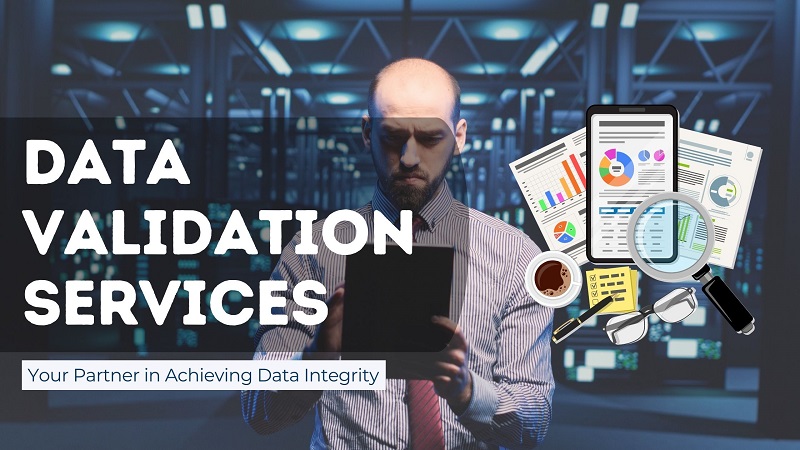Data Validation Services: Your Partner in Achieving Data Integrity

In an era where most business decisions are data-driven, their impact is decided by the quality of data in the system. The question is, how do you ensure that your data is valid, consistent, accurate, updated, and complete? Enter professional data validation services. It is a service toolkit that checks the accuracy, structure, and integrity of your data to ensure that it can be easily used for purposes like business intelligence or data analytics.
Significance of Data Integrity and Data Validation
Data integrity ensures that the data is error-free and trustworthy throughout its lifespan. Poor data integrity level leads to inaccurate analysis, misguided choices, and significant monetary losses. According to a report, poor data quality costs the United States economy about 3.1 trillion dollars per year. This staggering number highlights the importance of maintaining data integrity and having a data validation process in place.
Data validation makes sure that data from various sources is ready to be utilized by your organization. Such data follows the rules of your business, is consistent with your models and structures, and functions the way it is expected to. When your business data is validated, you ensure that the data is accurate, complete, and consistent so it is analyzed correctly.
Data validation services save your precious business time by cleaning up bad data. Here are a few other important aspects that make data validation beneficial:
- Validating the specificity and accuracy of data is pivotal to resolving the problems in your projects. When data is not validated, you risk making decisions based on unrepresentative and inaccurate data. This can result in significant business losses.
- Data validation is a part of the ETL (Extract, Transact, and Load) process that involves moving data sources to the destination data warehouse. Validating data is critical to boost the value of the data stored in a data warehouse.
- Data validation helps prevent errors during data entry or batch processing. Erroneous or invalid data can be corrected or rejected before it’s stored. This minimizes the requirement for time-consuming and expensive data cleaning processes later.
Data Validation Use Cases
It is important to note that data validation isn’t a versatile process that’ll fit businesses of all kinds. Different industries customize their data validation practices to fit their business model and needs. Nevertheless, the goal of data validation is ensuring data integrity and accuracy. Here’s a list of industry-specific use cases where data validation and data verification services are particularly impactful:
Finance
Verify the correctness of customer data, compliance reports, and records of data transactions to ensure protection against errors, legal risks, and financial disparities.
Healthcare
Guarantee that the IDs of patients are correct so that information on medication and dosage can be correctly collected and leveraged for patient care.
Education
Ensure that data on student enrollment corresponding to grades and course assignments are recorded and reported accurately.
Manufacturing
Match the specifications of manufactured components with the respective quality standards to prevent defects and ensure product safety.
Retail
Promote customized product recommendations and customer services, preventing problems like understocking or overstocking and supporting loyalty programs.
For industries with regulatory compliance and stringent data governance processes, the services of data validation companies are critical. With the help of data validation, it becomes easy to quantify if an organization meets the compliance and regulatory requirements.
Maintaining Data Integrity through Ongoing Validation
The key goal of data integrity is to keep your data in the best shape throughout its life—whether you store it, retrieve it, or utilize it. This assists you in adhering to rules, preventing data loss or compromise, and maintaining the trust of people. Consider it as protecting your data from intentional or unintentional changes, so it is consistent and complete. Data validation is not a one-time thing. Rather, it is a continuous process to ensure data integrity in the long run.
What matters the most here is the accuracy of the data. It’s a fine line, and while it might be tempting to compare it to a basic spellcheck, it’s more akin to a routine health check for your data. Ongoing data validation includes consistently running checks to ensure good data in the system. This is particularly important as data is constantly changing, shared, and updated and you wouldn’t want small issues to turn into major problems.
Data validation services go beyond quality checks. They include assessing where your data is coming from, how it is being utilized, and the best ways to handle bad data in the system. In essence, regular data health checks and data validation services enable you to address bad data in the system while implementing best practices to maintain data integrity.
The higher the quality of data, the better the decisions!
Conclusion
In a time when data holds utmost value, safeguarding it from loss or corruption has become more integral than ever. Data validation services are essential in making sure that your information is correct, consistent, and dependable. Partnering with a quality data validation service provider allows your organization to boost customer satisfaction, adhere to regulatory requirements, improve the efficiency of operations, and make data-driven decisions with confidence.
In the coming days, data validation services will undergo even greater changes through the implementation of cutting-edge technologies like AI and ML. Embracing the power of these services is crucial for businesses looking to gain a competitive advantage in the ever-changing digital landscape.









